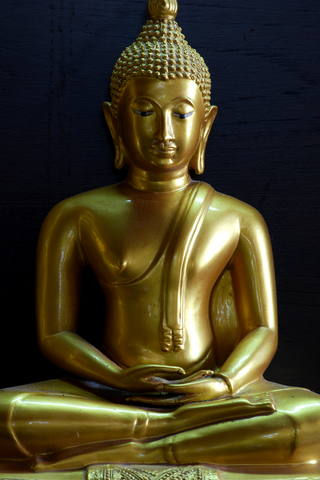The present of being present: cortisol and mindfulness meditation
Sometimes things are just timely. Like this post, which I am bringing back today for your consideration.
Happy Friday, folks! Wishing you a stress free weekend!
It seems that I write about stress a lot on FlashFree. Perhaps that is because like many, my life — namely my work — can be very stressful from time to time. However, according to the American Psychological Association, I’m not alone; most Americans suffer from moderate to high stress and the problem does not appear to be going away. Moreover? Work issues are the primary stressors in 77% of people.
From a midlife perspective, stress and its related hormone, cortisol, can cause a lot of health-related problems. In fact, not only does cortisol promote a fat dump in the midsection, but experts say that overexposure to cortisol and other stress hormones has a cumulative affect, leading to heart disease, sleep issues, digestive issues, obesity, depression and worsening of skin conditions. It’s critical to counter stress’ negative effects before they take their toll and start to do permanent damage. One important strategy to achieve a better balance is meditation.
Fortunately, a team of researchers at UC Davis’ Center for Mind and Brain are devoting time to studying psychological and physiological processes in order to explain the benefits of meditation. The framework for this effort is the Shamatha Project, which is apparently the most comprehensive meditation study ever undertaken. Most importantly, this scientific twist on a centuries old practice may ultimately elevate meditation’s place in Western medicine.
To better understand the effects of meditation on stress, the research team recently took 60 people (between the ages of 22 and 69) who had some prior experience with meditation, measured cortisol and body mass index and their current degree of ‘mindfulness,*’ and then randomly assigned them to a three month meditation retreat or a waiting list. Those on the waiting list participated in the same, three-month retreat at a later date. (*Participants completed a mindfulness questionnaire that measured the degree that these people directed their cognitive resources to sensory experiences and how often they drifted, as well as their ability to let go of distressing thoughts.)
At the retreat, the group met two times a day for one hour, guided sessions and the rest of the time (around 6 hours) practiced solo meditation in 20 to 30 minute increments. Meditation practices were focused on mindful breathing and relaxation and promoted compassion and kindness toward others. Overall, the emphasis was on present awareness rather than meandering into the future of ‘what if’s.’ During the middle of the retreat, all were encouraged to enter into silence for a period of about four weeks. Aside from scheduled meals and group meditations, everyone was on their own to decide sole meditation, exercise and free time.
Did learning how to direct and focus attention away from uncontrolled, ruminating thoughts and worry and toward a chosen target reduce cortisol levels? The researchers say that they found a correlation between a high score for mindfulness and a low score in cortisol, both before and after the retreat. The results were greatest for participants who were able to achieve the greatest increases in mindfulness, that is, the more that they reported directing their thoughts to the present/immediate experience, the lower their resting cortisol levels were. Participants also experienced large improvements in overall wellbeing, daily mood and emotional functioning.
While the findings do not prove cause and effect, they do suggest that changing the mind paradigm to focus on the now rather than the future may ultimately help to reduce our tendency to think about the past or worry about the future and in turn, counter excessive cortisol release.
Tonya Jacobs, a postdoctoral researcher and the study’s lead author, explains that “the idea that we can train our minds in a way that fosters healthy mental habits and that these habits may be reflected in mind-body relations is not news; it’s been around for centuries. But, accumulating evidence might help the idea — that the present is the best present we can give ourselves — be better integrated into Western mentalities and health practices.
Mindful meditation may ultimately prove to be one of our strongest defenses against stress and its companion, cortisol!
Read MoreThe present of being present: cortisol and mindfulness meditation
 It seems that I write about stress a lot on Flashfree. Perhaps that is because like many, my life — namely my work — can be very stressful from time to time. However, according to the American Psychological Association, I’m not alone; most Americans suffer from moderate to high stress and the problem does not appear to be going away. Moreover? Work issues are the primary stressors in 77% of people.
It seems that I write about stress a lot on Flashfree. Perhaps that is because like many, my life — namely my work — can be very stressful from time to time. However, according to the American Psychological Association, I’m not alone; most Americans suffer from moderate to high stress and the problem does not appear to be going away. Moreover? Work issues are the primary stressors in 77% of people.
From a midlife perspective, stress and its related hormone, cortisol, can cause a lot of health-related problems. In fact, not only does cortisol promote a fat dump in the midsection, but experts say that overexposure to cortisol and other stress hormones has a cumulative affect, leading to heart disease, sleep issues, digestive issues, obesity, depression and worsening of skin conditions. It’s critical to counter stress’ negative effects before they take their toll and start to do permanent damage. One important strategy to achieve a better balance is meditation.
Fortunately, a team of researchers at UC Davis’ Center for Mind and Brain are devoting time to studying psychological and physiological processes in order to explain the benefits of meditation. The framework for this effort is the Shamatha Project, which is apparently the most comprehensive meditation study ever undertaken. Most importantly, this scientific twist on a centuries old practice may ultimately elevate meditation’s place in Western medicine.
To better understand the effects of meditation on stress, the research team recently took 60 people (between the ages of 22 and 69) who had some prior experience with meditation, measured cortisol and body mass index and their current degree of ‘mindfulness,*’ and then randomly assigned them to a three month meditation retreat or a waiting list. Those on the waiting list participated in the same, three-month retreat at a later date. (*Participants completed a mindfulness questionnaire that measured the degree that these people directed their cognitive resources to sensory experiences and how often they drifted, as well as their ability to let go of distressing thoughts.)
At the retreat, the group met two times a day for one hour, guided sessions and the rest of the time (around 6 hours) practiced solo meditation in 20 to 30 minute increments. Meditation practices were focused on mindful breathing and relaxation and promoted compassion and kindness toward others. Overall, the emphasis was on present awareness rather than meandering into the future of ‘what if’s.’ During the middle of the retreat, all were encouraged to enter into silence for a period of about four weeks. Aside from scheduled meals and group meditations, everyone was on their own to decide sole meditation, exercise and free time.
Did learning how to direct and focus attention away from uncontrolled, ruminating thoughts and worry and toward a chosen target reduce cortisol levels? The researchers say that they found a correlation between a high score for mindfulness and a low score in cortisol, both before and after the retreat. The results were greatest for participants who were able to achieve the greatest increases in mindfulness, that is, the more that they reported directing their thoughts to the present/immediate experience, the lower their resting cortisol levels were. Participants also experienced large improvements in overall wellbeing, daily mood and emotional functioning.
While the findings do not prove cause and effect, they do suggest that changing the mind paradigm to focus on the now rather than the future may ultimately help to reduce our tendency to think about the past or worry about the future and in turn, counter excessive cortisol release.
Tonya Jacobs, a postdoctoral researcher and the study’s lead author, explains that “the idea that we can train our minds in a way that fosters healthy mental habits and that these habits may be reflected in mind-body relations is not news; it’s been around for centuries. But, accumulating evidence might help the idea — that the present is the best present we can give ourselves — be better integrated into Western mentalities and health practices.
Mindful meditation may ultimately prove to be one of our strongest defenses against stress and its companion, cortisol!
Read MoreBreathe in, Breathe out: Multitasking & Mindfulness Meditation
Got stress, a lack of focus, too much on your plate? Researchers from the University of Washington report that meditation, namely mindful meditation, can improve focus, benefit memory and reduce stress. What a concept, eh?
Mindfulness meditation is trained meditation. This particular study (reported in the May issue of Proceedings of Graphic Interface) used focused attention, which targets a person’s ability to voluntarily narrow or widen focus, place attention on the present moment, shift focus from one thing to another, and cultivate awareness of breathing and the body. While one group of workers participated in this type of activity, another were actively trained in progressive relaxation, whereby muscle groups are tensed and then relaxed, aided by mental imagery (e.g. “my arms are becoming heavy and warm) , an audio CD and weekly classes. Both of these groups then engaged in multitasking (e.g. scheduling a meeting, finding a conference room, writing an announcement, creating an agenda or eating and drinking). A third group waited 8 weeks, underwent multasking and then were trained in mindful meditation and retested.
The findings? People who were trained in and practiced mindfulness meditation reported lower stress levels during multitasking, were less negative and had less fatigue. Similarly, the group who received mindfulness training later in the study also reported reductions in their stress levels. What’s more, mindfulness meditation also appeared to improve focus (the participants shifted their attention less during a particular task) and memory.
The researchers attribute these benefits to the ability of mindfulness meditation training to help strengthen our ability to notice interruptions without necessarily stopping or diverting attention from the task at hand. Meditation has been associated with enhancing the ability to regular emotions; less stress translates into better recall. This particular domino effect is a win-win-win!
Obviously, more research is needed. But in the interim, it appears to mindfulness meditation may go well beyond hot flashes and attitude adjustments to multitasking, memory and stress reduction.
Om.
Read MoreBringing back the woo-woo…or the ‘ain’t no woo woo.’ Mindfulness, meditation and stress
Are you familiar with the end of the year crunch? I’m in the midst of it and although life is scheduled to slow starting next week, I am finding that I am having difficulty keeping up. So, today, I’m bringing back the woo woo in hopes that it might influence my own inability to calm down the adrenals right now.
Apologies for being self-serving. To be truly honest, this is one of my favourite posts of this year so I’m bringing it back. One word at a time. Let’s start with the first:
Relaxation.
It’s so elusive for many of us. And yet, so important to our overall health and wellbeing. In fact, researchers are finally discovering how relaxation actually counters changes that occur in our bodies that result from exposure to constant stressors.
For decades, Dr. Herbert Benson, founder of the Mind-Body Institute in Cambridge, MA and an associate professor at Harvard University, has been writing about the relaxation response, a “mind-body intervention that elicits deep changes in the physical and emotional response to stress.” Strategies that elicit the relaxation response include meditation, yoga, tai chi, Qi gong, deep breathing, controlled muscle relaxation and guided imagery. And although many would like to point to the “woo woo” factor at-play, an evolving and wide body of published literature is indicative of how interested the medical community is in the mid-body connection and the positive changes that these practices promote, including a slowing or heart rate, a reduction in blood pressure, improvements in blood sugar and fats, and even boosts in our immune system. However, what has long eluded researchers is what actually happens in the body to achieve these improvements.
In a novel study published in 2008 in PLoS ONE, Dr. Benson and his colleagues looked closely at 19 volunteers who had practiced relaxation response strategies (e.g. meditation, yoga, repetitive prayers) for as long as 20 years and compared them to 20 novices, individuals with no relaxation practice experience. These novices were provided with training sessions for 8 weeks that included information about how to reduce daily stress and the relaxation response and a 20 minute, individually-guided session comprising diaphragmatic breathing, a body scan and meditation.For 8 weeks thereafter, the novices then used a 20-minute relaxation CD at home and were asked to review the informational brochures. Blood samples and analysis of gene expression between experienced and novel relaxation practices, and pre- and post-training were then compared.
Importantly, while the researchers observed distinct changes in the genes in experienced relaxation practitioners compared to novices, when the novices started to incorporate relaxation practice into their lives, they also started to express similar positive alterations in their genes. Moreover, these changes are directly related to how cells respond to stress and create free radicals and inflammation that can lead to long-term damage. Additionally, type of relaxation strategy that was practiced was of no important; by achieving a relaxation state, individuals could make positive changes in their cellular structures thought to promote health.
Both inner and outer psychological states and environmental factors play a role in how women experience peri and post-menopause, their self-esteem, attitudes and severity of symptoms. If a daily practice of some sort of relaxation strategy can actually alter genes in a way that improves health and well-being, why can’t that daily practice also improve the menopausal/midlife experience?
While I’ve long embraced the idea, I’ve never actually made a concerted effort to incorporate some sort of relaxation strategy into my daily activities. I’m going to change that. Ain’t no woo woo but a woot woot so far as I can tell.
Read MoreMeditation in motion: Tai Chi and the ‘pause
I’ve written about yoga and meditation/mindfulness training and how both may help with menopausal symptoms in terms of alleviating stress and improving overall wellbeing. However, what about Tai Chi?
Tai Chi is an ancient Chinese martial arts practice that uses a self-paced system of soft flowing movements to improve respiration and deep relaxation. It has also been shown to boost muscle strength, coordination and physical condition, improve balance and like yoga and mindfulness training, benefit overall wellbeing. On the health side, it’s been linked with better sleep quality and duration, enhanced circulation and in fact, is considered a weight-bearing exercise akin to aerobic exercise of moderate intensity. As such, it may even help prevent osteoporosis. Yet, unlike regular strength training Tai Chi appears to offer an important means by which risk of metabolic heart disease during menopause may be reduced.
For women specifically, hormonal changes – namely a steeply progressive increase in testosterone — can contribute to a risk of developing metabolic syndrome (i.e. the cluster of risk factors — abdominal fat, high blood pressure and cholesterol levels and insulin resistance –that increases the likelihood of developing heart disease and diabetes). Moreover, as women age, the ability to effectively metabolize blood fats and maintain ample antioxidant defenses in their bodies requires higher maximal aerobic capacities (which inherently decline with age). Conversely, being sedentary deteriorates the efficiency by which fats are burned or utilized by the body and also negatively affects antioxidant defense lines and their ability to adapt to sudden or chronic exposure to oxidative imbalances in our bodies that can wreak havoc on cells and lead to build up of plaques and heart disease.
Where does Tai Chi fit in?
Yogic pranayma breathing has been linked to improvements in antioxidant capacity and in lower oxidative stress markers. Moreover, it may also improve cardiorespiratory function. Tai Chi combines postures with slow, deep breathing (i.e. 6 breaths per minute) and may also convey the same benefits. In a recent study published in the Journal of Aging Research, 8 premenopausal and 7 post menopausal sedentary women were asked to participate in an 8-week Tai Chi program that involved the following:
- 75 minute training sessions twice weekly consisting of a 5 minute check in, 10 minutes of stretching/warm-up, and 60 minutes of a modified 18-posture Tai Chi and Tai Chi fan style. The Tai Chi routines coupled breathing to music, took a minute to a minute and a half per motion. The women learned five to 10 postures per week and the complete set was practiced for two weeks. Instructors were also sure to monitor and correct postures during each class.
- Twice-weekly, 60 minute at-home practice that also included completion of a log that detailed the practice (to insure compliance).
- Measures of body weight, diet, physical fitness, balance, flexibility, muscle strength, maximal aerobic capacity and blood samples.
Not only did 8 weeks of Tai Chi practice significantly improve balance, muscle strength and flexibility in both groups, but also produced as much as an 18% decline in a major marker for heart disease risk (i.e. plasma total homocysteine). Additionally, Tai Chi combined with measured, slow deep breathing improved the activities of antioxidant markers in the bloodstream that play a role in defending cells against damage from oxidative stress.
Although this study is quite small and bears repeating with significantly higher numbers of women, the findings do imply that Tai Chi and slow deep breathing have the potential to play an important role in improving functional/physical declines that occur during menopause and equally if not more importantly, improve antioxidant defenses against metabolic diseases, especially heart disease. Tai Chi is not only low impact, low-velocity and safe, but within the framework of menopause, it may prove to be a golden ring amongst alternatives to prevent disease. Meditation in motion, indeed.
Read More









